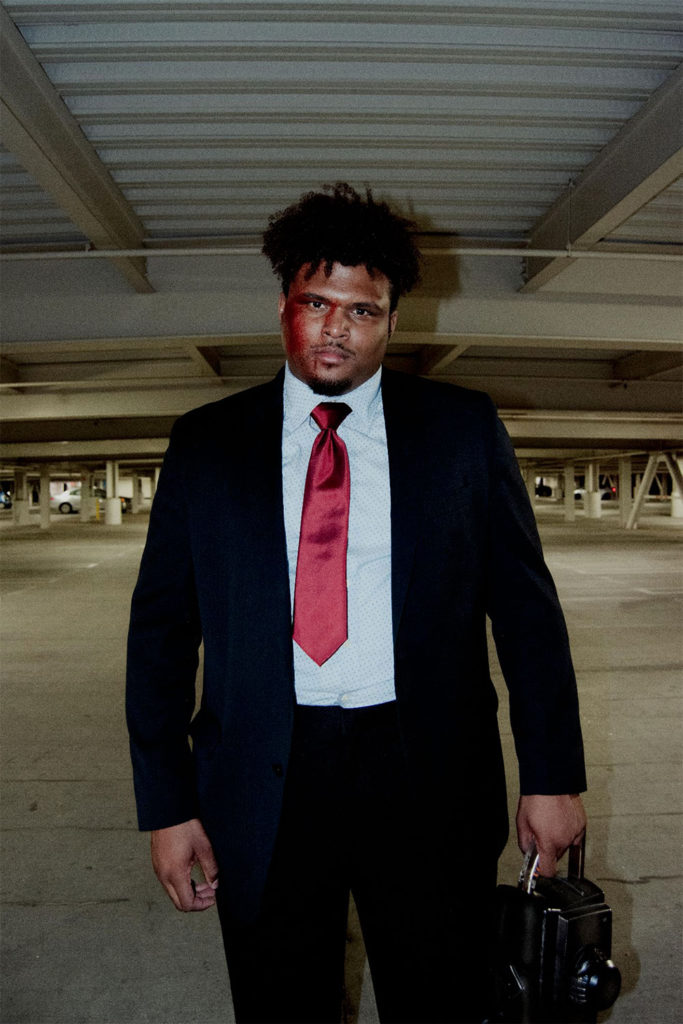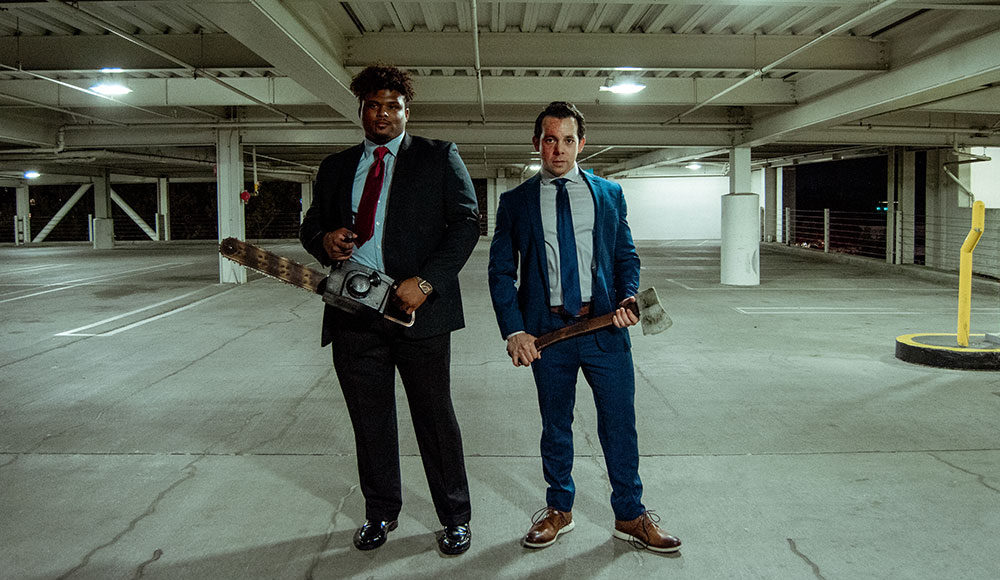Chloe Angst is tired of Oklahoma!
The creative and artistic director of B.A.D. Musical Theatre pulls her car over to the side of what sounds like a highway to do this interview. A millennial burning the candle at both ends, she is on her way back home to Fremont, by way of her day job up in San Francisco followed by rehearsals down in San Jose.
The first production for the brand-new company—its initials stand for Bay Area Diversity—is a most decidedly un-Oklahom-ian choice. American Psycho: The Musical is in the final stage of rehearsal before the show opens July 12.
The weariness of multitasking and the tech-week-of-a-show-tiredness she can deal with. What drove Angst to create B.A.D. is a deeper fatigue, with the Oklahoma-ization of local theater. In other words, a story we’ve seen a million times, offering little new or of sustenance, with performers who are expected to behave with utmost professionalism despite not being paid a living wage.
While Angst herself is a white woman, she wasn’t always considered the right “type” to be cast, and she understands that while this is a challenge for her, it is doubly so for people from marginalized communities: people of color, people with disabilities, people of all sizes, shapes, shades and genders.
B.A.D. Musical Theatre, a community-driven theater company with an egalitarian ethos, may be the wind of change that the Bay Area theater community needs, starting with a commitment to diverse casting. “Oftentimes you see the same people being cast in every show for certain companies. [There is] a lot of nepotism and absolutely no representation of people of color. These companies aren’t doing any work to change that.”
The work of which she speaks is “taking the extra steps needed to get full representation of our community on stage. It’s about accessibility and inclusivity of new faces.”
For B.A.D., that inclusivity extends to casting with a focus on body diversity, physical abilities and gender diversity in addition to racial representation. B.A.D. prioritizes making theater accessible to the community and giving opportunities to those to whom they are most denied instead of finding the most polished talent or “correct look” to create perfect productions.
The company has tapped Cordelia Larsen to serve as director of equity, diversity and inclusion—unusual for such a small organization, but a must for Angst’s vision. “They have expertise in prioritizing that aspect,” Angst says of Larsen.
“Strong reasons make strong actions.”
—Shakespeare
“We recognize that we are community theater,” Angst says. “There’s this use of the word ‘professionalism’ in the theater community. We are professional, but we understand that people can’t survive in the Bay Area doing this.”
How B.A.D. accommodates this reality, Angst explains, is to make accommodations for actors who must travel to rehearsals on public transportation or other problems with scheduling. Meetings and rehearsals start with check-ins, to make sure people are “comfortable, having a good time, and have a chance to shine.”
In the greater Bay Area, there is a huge gap between heavily funded, semi-professional theater companies and hyperlocal amateur troupes.
In the middle there is a need both for a true grassroots community theater that casts real people and cuts through outdated ideas about theater: namely, that in 2024 anyone can make a living off of professional theater without some type of outside financial support; that professional theater needs to ape film conventions; and that community theater needs to look and sound like professional theater.
B.A.D. stands not only for diversity, but also “the outcasts, the renegades, who are ready for something new,” says Angst, who sees her mission as not only bringing a breath of fresh air to the local theater scene, but also a way to make productions sustainable in financially and politically uncertain times. “Nobody’s gonna do it if we don’t get off our butts and do it.”
With fringe status comes advantages, such as the opportunity for members of the general public to shadow actors, the directing team and the crew, and behave as versatile interns, something less accessible in larger, more structured organizations. Angst and her leadership team—which includes EDI Director Larsen and co-director and choreographer Valerie Valenzuela—are rewriting the unwritten rules of how things are done.
“There’s this egalitarian attitude toward everything instead of a more hierarchical model where everybody’s scared of asking the director questions because of fear of retaliation,” Angst says, explaining that the entire cast and crew has her number and that she encourages open communication.
“Just a happy camper! Rockin’ and a rollin’”
—American Psycho
Patrick Bateman, the main character in the Bret Easton Ellis novel that became a film and finally a stage musical, is one of the most terrifying villains in modern literature. Possibly this is due to his resemblance to the friendly neighborhood toxic bro, but on steroids. The world he lives in is a cisheteropatriarchal wet dream—i.e., lots of good-looking, Caucasian people preening and dick-measuring their way through the story as Bateman sneakily murders people while monologuing hot takes on popular culture.
The 1991 book and 2000 film scandalized critics and freaked out audiences, and while the play premiered in London and became a favorite, it only ran one year in London and a brief run on Broadway, cut short by many factors but perhaps most by premiering at the same time as the beloved Hamilton.
So why produce this white-centered, toe-curling tale of success and sociopathy in 2024?
“First of all, I love the show,” Angst says. (Solid logic: If you start an artistic community for the love of art, definitely pick a show you love.)
As cars whiz by and threaten to drown out Angst’s voice, she projects it through the noise around her into her phone as she explains the ways that this particular musical is unique. It is both what is known as a “jukebox musical” (containing popular songs woven into the story) and a traditional one, with multiple original songs by composer Duncan Sheik.
The show is budget-friendly to produce because it only requires one keyboardist and the rest of the music is electronic. The entire soundtrack has the quality of the time period in which the story is set: the 1980s, in all of its synth-pop glory.
What does it mean for a company with “Diversity” in its name to come out of the gate with a play about a rich, white alpha bro who loathes himself so much he turns it outward and chops everyone up? Thematically, the show is “eerily relevant to the times, with the election coming up,” explains Angst.

Patrick Bateman happens to be obsessed with a certain 1980s-era version of a man we know by many names who wrote a book that rhymes with Fart of the Steal. When the book was written, Orange Julius Caesar hadn’t even said anything about standing in the middle of Fifth Avenue and shooting people yet, but Patrick Bateman would have loved that.
In Angst’s vision, there are multiple layers to B.A.D.’s production. To that end, the space they are using—StageOne Creative in San Jose, a “creepy, sterile, white space” usually employed as a film studio—is perfect for the video projections used to amplify themes in the immersive show. In a stroke of genius, this production leans into the non-traditional casting like actors of color or size. “What we’re seeing onstage is reality and it’s not part of Patrick’s mind. The diverse casting is the real world,” Angst says. Meanwhile, the video projections show the way the characters appear in Patrick’s head: white, conventionally attractive, cisgender, etc.
As part of B.A.D.’s strategy to draw a younger crowd to the theater, Angst looks forward to producing this frankly edgy horror comedy musical. “It is disturbing. It goes there. We want to get that reaction out of the audience. We want them to feel this.”
By way of content warnings: American Psycho is recommended for ages 18 and up, is immersive in the staging, and has very mature subject matter, including depictions of violence and simulated sex, drugs and alcohol.
Pretty much what you expect from the American Psycho canon, but with singing!
“Acting is behaving truthfully under imaginary circumstances.”
—Sanford Meisner
Within the company culture of open communication and frequent check-ins, Angst says that the cast—which are actually two casts in alternating productions, to give more actors a chance to perform—have become thick as thieves.
“People are having a wonderful time. From the first rehearsal they became such quick friends. I’ve never seen this happen before in a cast—they started hanging out with each other right away,” Angst says.
Beyond the awards, fellowships, grant money and government art councils, theater is an exciting, evolving art form. At its core it should be about a bunch of people working extremely hard on a common goal to uplift and to entertain each other and those around them.
“This is a community,” Angst says. “We’re doing this together, we’re here to support each other and we’re here to have a good time. That’s the point of why we’re doing this.”

Creating a grass-roots theater company in itself is a radical act. Centering that project around the principle of diversity deepens both the sense of community and the mission. In the present day, even as the most prestigious local companies struggle to stay afloat, the underdogs at B.A.D. toil double to ensure that there will be live Bay Area Theater in the years to come, even if those larger outfits fold as their leaders pass on.
“We’re just here to create the future of community theater,” Angst says, “not to mention, our tickets are fairly cheap.”
The egalitarian focus and heart-centered community service of Bay Area Diversity Musical Theatre allows the company the freedom to create unique productions and the resilience to mount them amid economic instability and scarce resources.
The most powerful resource they have, it turns out, is each other.
“It’s very supportive,” Angst says, “and it makes me feel like I’m doing something right.”
American Psycho: The Musical runs July 12-21, including one ASL-interpreted performance and one masks-only performance. StageOne Creative, 196 N 3rd St, San Jose; $28+. badmusicaltheatre.com



